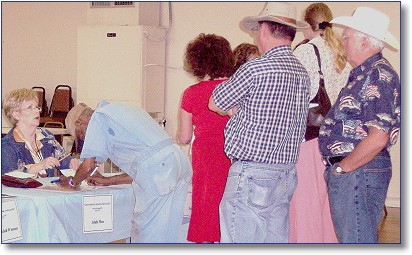Joint investigation of theft leads to 3
arrests
The Guardian-Journal
A joint investigation between the Homer Police Department
and the Claiborne Parish Sheriff’s Department led to the arrest of three people
and a warrant for another.
On July 30, the Claiborne Parish Sheriff’s Department
received a call from the 600 block of Hwy. 540 in Homer in reference to a
stolen Honda 4-wheeler and the thief was traveling south towards Homer.
Later that morning, the sheriff’s office received a call
stating that a truck was found in the ditch on Hwy. 540, north of Homer. Deputy
Jeff Pugh checked it out and noticed a tool box and several other items in the
bed of the truck that the previous caller had identified as his.
An investigation by the sheriff’s department and the
Homer Police Department led to the arrests of Yrue Young and Richard F.
Rockholt, both 18 and residents of Homer, on Thursday, August 16. Both men were
charged with illegal possession of stolen things over $500. Young and Rockholt
were transported to the Claiborne Parish Detention Center with bonds for each
set at $10,000.
In connection with the investigation, Homer Police Chief
Russell Mills arrested Trent Gore, 24, of Bradley, Ark., Monday. Gore was
charged with possession of stolen things under $300, and theft under $300. He
was booked into the Claiborne Parish Detention Center and released on a cash
bond of $500 on each charge.
After further investigation, Claiborne Parish Sheriff’s
Detective Duffy Gandy obtained an arrest warrant for Brandon Lee Montgomery,
22, of Sarepta, for theft over $500.
Mills stated that additional warrants will be obtained by
the police department for charges against Montgomery.
The Honda 4-wheeler as well as the toolbox and tools were
recovered Thursday and have been returned to the owners.
Man found dead on Lake Claiborne
The Guardian-Journal
A man
was found in Lake Claiborne Thursday afternoon after the Claiborne Parish
Sheriff’s Department received a call in reference to a boat found adrift.
Hubert
Hayden, 79, was found dead by law enforcement agents at approximately 6 p.m.
Captain Wesley Walker, of the Louisiana Department of Wildlife and Fisheries,
Law Enforcement Division, said there was nothing to indicate anything other
than he just fell out of the boat.
“We
believe he’d fallen out of his boat causing him to drown,” he said. “We do know
that it was very hot and he was an elderly man. It was believed that it
happened earlier that morning, but he was found later that day.”
After
the sheriff’s department received the call, they interviewed several witnesses
and concluded that Hayden had gone missing. Witnesses said they knew Hayden had
gone out that morning to set trot lines, but he should have returned home
earlier that day.
Hayden
was not wearing a life jacket. Walker said that it is not required that adults
wear life jackets, but they must be made available. He did say, however, that
children under the age of 13 are required to wear life jackets when the boat is
running in the water.
It is
also customary for enforcement agents to look into any reports of boats adrift
in the water, and many times there is no foul play or collisions of any sort.
“Most
of the fatalities in boating incidents are from people falling overboard,” Walker said, “and many times, these incidents involve smaller boats. A lot of times, the
boat may have just drifted from someone’s dock, but the Sheriff’s Department
called Wildlife Enforcement agents and we checked into it.”
Walker said it was a great loss for several agents in the law
enforcement division, because Hayden was good friends with retired Captain
Donnie Bates and had developed a good relationship with several others in the
Department of Wildlife and Fisheries. He was seen quite a bit on the lake
fishing.
The
cause of death is not yet known because the boating incident investigation and
coroner’s report is not yet complete.
Involved
in the search for Hayden were Lake Claiborne State Park rangers who had a boat
in the water assisting with the search; the Claiborne Parish Sheriff’s
Department, who also had a boat in the water with divers ready to assist; and
the Louisiana Department of Wildlife and Fisheries.
Noted Organist to Present Program in
Homer
Dr. Ann
Labounsky of Pittsburgh,  PA will present an organ recital at the First United
Methodist Church in Homer on September 2, 2007, at four in the afternoon. Dr.
Labounsky is chair of the Organ and Sacred Music Department at Duquesne
University and is a Fellow of the American Guild of Organists. She has an
international reputation as a virtuoso performer and is especially noted for
her recordings of the works of French organist and composer, Jean Langlais,
whose centennial she is marking this summer with a performance at Notre Dame
Cathedral in Paris. She studied with M. Langlais at the Schola Cantorum while a
Fulbright Scholar and is the author of a biography, Jean Langlais: The Man and
His Music published in 2000 by Amadeus Press.
PA will present an organ recital at the First United
Methodist Church in Homer on September 2, 2007, at four in the afternoon. Dr.
Labounsky is chair of the Organ and Sacred Music Department at Duquesne
University and is a Fellow of the American Guild of Organists. She has an
international reputation as a virtuoso performer and is especially noted for
her recordings of the works of French organist and composer, Jean Langlais,
whose centennial she is marking this summer with a performance at Notre Dame
Cathedral in Paris. She studied with M. Langlais at the Schola Cantorum while a
Fulbright Scholar and is the author of a biography, Jean Langlais: The Man and
His Music published in 2000 by Amadeus Press.
Her
performance in Homer is being given in honor of Margaret Ford Gladney in
anticipation of Mrs. Gladney’s 90th birthday early next year. The recital is to
be held in the sanctuary where her father, Darden Ford, served as Choir
Director for many years.
The
program is open to the public and a reception will follow in the church parlor.
For more information on Dr. Labounsky and to hear
selections of her performances, visit her website at www.AnnLabounsky.com.
Accident causes Athens to lose power

The Guardian-Journal photo/Michelle Bates
This was the scene after Claiborne Parish
firefighters fought to put out a fire that could have become a lot worse than
seen here. Luckily, no one was injured in this accident.
MICHELLE BATES, Editor
A one vehicle accident on Hwy. 518 knocked out power for Athens residents for approximately two hours Monday as the Claiborne Parish Fire
Department scrambled to put out a fire caused by live electricity from power
lines dangling dangerously close to the ground.
Witnesses stated that Sarah Pate, 81, backed out of her
driveway and headed westbound on Hwy. 518 when she said she saw a deer run
across the road. Louisiana State Trooper Chris Bastow said she swerved to avoid
hitting the deer and, it is believed that she hit the accelerator instead of
the brake pedal. When she swerved, she hit an electrical pole, causing the pole
to break and fall across her Nissan truck.
Pate was taken to Homer Memorial Hospital by family
members after she began complaining of back pain and shortness of breath.
Unbelievably, as law enforcement waited for electric crews to arrive, they
noticed the engine in the vehicle was still running.
As electric crews from Entergy arrived on the scene,
smoldering embers under the truck caused the front end of the truck to catch
fire. Passersby, the electric crew and law enforcement all took a few steps
back as the front passenger tire blew out from the fire. An explosion at that
time was a very real possibility, said Claiborne Parish Deputy Ben Booth,
because of the combination of the truck burning as well as live power lines still
lying on top of the vehicle.
The fire department quickly put out the fire and stayed
on scene to make sure the fire was out. Electric crews had to cut power to the
dangling lines and reroute power to the residents of Athens while a new pole
was set.
“It’s a good thing nobody was hurt,” said State Trooper
Mike Antilley, who was also on scene. “It could have been a lot worse.”
The Claiborne Parish Sheriff’s Department, the Claiborne
Parish Fire Department, Louisiana State Troopers and Entergy electric crews all
responded to the scene of the accident.
Pate was cited for careless operation.
Drug paraphernalia in car leads to
arrest of Homer resident
The Guardian-Journal
A
routine traffic stop led to the arrest of a man for speeding and DWI on
Tuesday, August 14, after Claiborne Parish Sheriff’s Deputy Matt Harris stopped
a vehicle.
After
the driver of the vehicle was arrested, a passenger in the vehicle, Lonnie M.
Winzer, 41, of Homer, had several beers, later identified as Bud Ice, in the
floorboard between his feet. One beer, about three quarters full, was
discovered opened.
Harris
asked Winzer to step out of the vehicle and he was questioned about the
possibility of any dangerous weapons or illegal narcotics on him or in the
vehicle. Winzer stated he had several knives and razor blades in his pockets
from work, but he didn’t know about inside the vehicle.
Harris
searched the vehicle and discovered a metal pipe object (crack pipe) and a
drill bit located inside a pack of Doral cigarettes on the passenger side
floorboard of the vehicle. After making the discovery, Harris questioned Winzer
about his findings and Winzer admitted the pipe was his.
Winzer
was then arrested for open container and possession of drug paraphernalia. He
was transported to the Claiborne Parish Detention Center, booked on the charges
and bond was set at $1,000.
On
Saturday, August 20, a vehicle was observed crossing the fog line (the white
line on the shoulder of either side of the road). Deputy Paul Brazzel observed
this vehicle traveling south, and followed him. He observed the vehicle travel
from the fog line to the center line several times, and stopped the vehicle
just north of Hwy. 2 on Hwy. 9.
The
driver, later identified as Jerry Allen Moore, 56, of El Dorado, Ark., was asked to step from his vehicle. Harris detected the strong odor of an alcoholic
beverage and Moore was arrested. A search of the vehicle revealed two rolled
cigarettes containing a green leafy substance believed to be marijuana.
Moore was then transported to the Claiborne Parish Detention Center and booked on charges of DWI 1st, improper lane usage and simple
possession of marijuana.
Homer man arrested for rape of a
12-year-old
The Guardian-Journal
A
24-year-old man was arrested Friday, August 17, for the aggravated rape of a
12-year-old child, according to Claiborne Parish Sheriff Ken Bailey. Jerry Lee
Cole, of Homer was booked into the Claiborne Parish Detention Center with bond set at $25,000.
Deputy
Ben Booth led an investigation into this allegation which allegedly occurred in
July.
There
will be more to come as this case develops.
DWCC employee arrested for child porn
Daniel Davidson
Special to The Guardian-Journal
A
Sarepta man,  who is also employed as a prison guard for David Wade Correctional Center in Homer, has been arrested for possessing child pornography.
who is also employed as a prison guard for David Wade Correctional Center in Homer, has been arrested for possessing child pornography.
Carl D.
Cook was arrested Thursday, August 16, for 10 counts of possession of child
pornography.
Cook
was arrested at his place of residence following the execution of a search
warrant at his Hearron Road home.
Webster
Parish deputies and Internet Crimes Against Children (ICAC) Task Force agents
conducted the search.
“He
(Cook) was outside mowing his yard when the officers arrived,” Webster Parish
Sheriff’s Office Capt. Steve Cropper said. “But he had left everything open on
the computer for them to see when they walked in.”
During
the search, officers discovered numerous videos and images depicting child
pornography and sexual acts of young children.
At this
time, 10 known videos and images have been identified; however, officers still
have to search four hard drives and close to 100 CDs and DVDs.
Cook
admitted to downloading and sharing child pornography over Limewire on the
Internet. More charges are pending as the investigation progresses.
Movie casting call draws hundreds to
City Hall



The Guardian-Journal photos/Michelle
Bates
Hundreds came to City Hall Monday as
everyone wanted a chance to be a movie extra in the upcoming film about the
infamous Bonnie and Clyde. The film is expected to cast Oscar-winning stars in
the roles of Bonnie Parker and Clyde Barrow. As soon as contracts are signed,
filming will most likely begin in November or December.
Claiborne Parish woman turns 100 Friday
The Guardian-Journal - Jimmy Dean
Lifelong Claiborne Parish resident Rachel
Wafer Cotton has kept her sense of humor as she nears 100 years of age.
JIMMY DEAN, Feature Writer
100 years ago most people in Claiborne Parish got their
drinking water and bath water from a well or used stored rainwater for bathing.
100 years ago most people in Claiborne Parish used lye
soap to wash clothes by boiling them in a washpot over an outside fire.
100 years ago most people in Claiborne Parish rode to
town once a month in a wagon pulled by a horse or a mule to get
groceries—mostly sugar and a little flour, things they couldn’t grow on the
farm where most lived. As for meat and vegetables, most country folk in the
parish had a few chickens and hogs and a cow and a garden and some fruit trees.
100 years ago most people in Claiborne Parish had never
seen an airplane and rarely saw a car.
100 years ago many if not most people in Claiborne Parish
could neither read nor write and had no birth certificate.
100 years ago most people in Claiborne Parish had no
electric lights, just oil lamps. They usually went to bed at dark and were up
before daylight.
100 years ago most people in Claiborne Parish had a
fireplace—no one had central air or heat.
100 years ago Rachel Wafer was born in Forest Grove
Community where she grew up the youngest of 10 children born to Governor and
Chatty Adams Wafer.
Rachel married Willie Cotton before she was 18. “But we
said I was 18 so we could get married,” she chuckles. She and Willie went on to
have 6 children, 3 girls and 3 boys. A son and a daughter live in California, her other children having already passed on.
Mrs. Cotton lives alone with the help of a home health
aide who makes the bed and does some washing and a little cooking. “And she
takes me to the doctor and to get my medicine,” explains Mrs. Cotton.
As would be expected of someone who will be 100 in a few
days, Mrs. Cotton has some medical problems. Her eyesight is failing, and she
uses some eyedrops for glaucoma. I also noticed a walking stick by her chair.
Mrs. Cotton says she fixes most of her own meals. “I may
cook some peas or make a sandwich. And I tell the home health aide to let me
wash some dishes because I need to move around or I get stiff and sore.”
As I talk with Mrs. Cotton, she remembers hard times
growing up. She says, “That’s just how things were back then. Life may have
been hard, but we didn’t have to lock our doors. There wasn’t the meanness then
that there is nowadays.”
She continues, “I was the youngest, and I learned to plow
the mule after my older brothers had grown up and left home.”
When I ask about school, she answers, “I went to the
eighth grade. A lot of times we couldn’t go to school because the roads were
muddy, and you couldn’t get to school after a big rain. Sometimes we had to
work in the field and couldn’t go to school.”
She remembers how there were no automatic washers or
dryers in the early 1900s. “We hung all the clothes out on the clothes line. We
didn’t have to worry about nobody taking anything back then,” she says.
For ironing, she says, “We built a fire in the yard and
put two or three, sometimes four irons in the fire. We would use one until it
cooled, then put it back in the fire to heat up again and use another one until
it cooled.” They switched irons until all the clothes were done.
During my years with Social Security, I was required to
see proof of everything, so I ask to see Mrs. Rachel’s Medicare card. Sure enough:
She’ll be 100 on August 24.
-0-0-0-
Maturity is...the ability to bear an injustice without
wanting to get even.—Abigail Van Buren
Center lane construction on Hwy. 79
slated to begin in September

The Guardian-Journal photo/Michelle Bates
This picture shows the stretch of Hwy. 79
that will get a center, two-way turning lane.
MICHELLE BATES, Editor
Construction
on a center turning lane on Hwy. 79 beginning at North 8th Street is slated to
begin in September, after three years of planning.
Construction
will begin at North 8th Street, located at Lynn’s Flower and Gift Shop and will
go to Louisiana Highway 520, beyond Hwy. 2. Once finished, the project will
include a two-way center turning lane, including extra wide turn lanes on Hwy.
79.
According
to J.T. Taylor, Claiborne Parish Chamber president, the idea for the project
began three years ago after he’d witnessed several accidents in front of the
old Wal-Mart location.
“I
witnessed accident after accident out here (at Dimex Sales),” Taylor said. “I
had the chief pull the records, and I believe there were 11 or 12 accidents out
there that year (2004).”
After
some thought and a lot of work, this project was added to the state projects in
October 2004. He met with Keith Tindell, District Traffic and Operations
Engineer with the Louisiana Department of Transportation and Development, and
got the ball rolling on the construction project through a federal highway
program through the Safety Committee.
“The
Safety Committee recommended to include this project in the 2008-09 fiscal
year,” he said. “I met with Rep. Jim McCrery several times to move this project
forward. The bottom line is that they assure me that the contract for the
project will be let on August 29, 2007. He expects construction to begin in
September.”
Hunter’s ed course to begin August 29
The
Claiborne Parish Sheriff’s Office along with David Wade Correctional Center will be sponsoring the Hunter Education Courses for 2007.
The
Hunter Education Course will be conducted at the Homer Fire Station from
August 29 through September 1.
The
class schedule is as follows:
August 29: 6 until 9:00 p.m.
August 30: 6 until 9:00 p.m.
September 1: 8 a.m. until 12 noon.
Anyone
interested in this Hunter Education Class must pre-register with the Claiborne
Parish Sheriff’s Office at: 927-2011 or by contacting Colonel Brad Rogers at
927-0453.
In
1985, hunter education became mandatory in Louisiana. Anyone born on or after September 1, 1969 is required by law to complete the Louisiana Hunter Education course
before purchasing a hunting license. The minimum age for certification is 10.
|
Dove
season will officially open at noon Saturday, September 1. Teal season opens on
September 15. Claiborne Parish Sheriff Ken Bailey asks that all hunters obtain
their licenses early to avoid long lines. Also, federal duck stamps may be
obtained at the sheriff’s office. Federal duck stamps are available at the U.S.
Post Office, but to save a little time, Bailey said, hunters may obtain their
duck stamps at the sheriff’s office when they purchase their state licenses.
|
|
Haynesville PD hires two police officers
Dispatcher hired for second shift at PD
MICHELLE BATES, Editor
The
Haynesville Police Department has hired two more officers to help keep the
streets safe.
Chief
of Police Anthony Smith went before the Haynesville Town Council Thursday, and
presented two people, Willie Evans and Aaron Christian.
Working
as an international police officer, Evans worked for Dyncorp International in Afghanistan training the Afghani people to police their own streets. He currently works for
the Webster Parish Sheriff’s Department as a narcotics officer and has trained
several others in the field of narcotics investigations. He also worked as a
police officer for the Town of Haynesville for two and one-half years as well
as an instructor for drug and homicide cases. His resume is long and full of
experience in law enforcement, which Smith feels will be a great asset to
Haynesville.
“He has
a lot of qualifications and experience,” Smith said during the Haynesville Town
Council meeting. “He’s going to be very instrumental to us.”
There
were some questions regarding the legality of Evans working for both the
Webster Parish Sheriff’s Office and the Town of Haynesville.
Haynesville’s
town attorney, Danny Newell, said it would be just like any other person who
holds two jobs at once.
“Obviously
he can’t be on the payroll of two entities at the same time,” Newell said. “He
can have two jobs, he just can be working for two entities at the same time.”
Explaining
briefly, Smith explained that Evans would be working for the police department
at different hours than his job at the sheriff’s office in Webster Parish. In
other words, for example, Evans would work a day shift for the Webster Parish
Sheriff’s Office and work the night shift for the Haynesville Police
Department.
Once
the issue was cleared up, the council decided to hire Evans.
Smith
also put before the council hiring Aaron Christian as another patrol officer
for the police department.
“He was
with us before, and I highly recommend that he return to work for us,” Smith
said. “He will have to go through the Shreveport Academy, but he’s worked for
us before as a police officer. He really likes working as a police officer, and
when he left here before, he left on good terms and we’re glad to have him
back.”
He has
experience working at DWCC and other programs that have given him experience in
police work.
Also,
Jackie Roberts was hired as a night shift dispatcher for the Haynesville Police
Department. There were concerns about conflicts with her current position as
editor of The Haynesville News, but she said that the days and hours she would
be working for the police department would not conflict with her position as a
news reporter. The council voted to hire Roberts as a dispatcher for the second
shift.
Watershed District addresses aquatic
plant problem
MICHELLE BATES, Editor
The
Watershed District held its monthly meeting Monday to address the problems of
troublesome aquatic vegetation in Lake Claiborne as well as some tools to
prevent the vegetation from getting out of hand.
Dr.
Alice Stewart,  Secretary of the Watershed District and Chairman of the Lake Committee, said she had received several complaints about water weeds.
Secretary of the Watershed District and Chairman of the Lake Committee, said she had received several complaints about water weeds.
Residents
who live around Lake Claiborne said the aquatic vegetation was really not that
bad, but the problem needs to be addressed before it does get bad. Another
problem is this vegetation is hard to get to because it is growing amongst the
trees and difficult areas off the channel.
Dr.
Robert Haynes, a botanist who specializes in aquatic vegetation, said that
aquatic plants were good for a lake because without the plants, there would be
no fish. He did say, however, that this vegetation needed to be controlled.
“I have
watched populations of aquatic plants increase and decrease,” he said. “In Alabama, it was covered with hyacinth and then it disappeared. It was hyacinth free for 30
years and now it’s starting to come back.”
He said
that even though this vegetation was a problem now, it wouldn’t be in the
future.
“I
assure you,” he said, “it will crash in Lake Claiborne. If you don’t do
anything to the lake now, it will get worse, but it will crash. The best thing
in the world (to kill it) is a good, cold winter.”
Hyacinth,
a floating plant that does not attach to the bottom of the lake, acts as an
excellent source to filter the water – filter out sediment and clean the water
through its roots, Haynes said. The problem is that if there is too much of it,
it makes it difficult for boaters to navigate the lake.
Many of
the problem vegetations include hyacinth, alligator weeds, hydrilla and giant
salvinia. Haynes emphasized that the giant salvinia is a really bad plant to
have in a lake because it causes problems in several different areas of
economics as well as safety.
Another
problem with this aquatic vegetation is that it’s a possibility that Lake Claiborne is filled with nitrogenic waste, which means that aquatic plants flourish.
Haynes said that if this is not present, then the plants will not grow. It
comes from places like septic tanks and wastewater that eventually makes its
way into the lake waters. This nitrogenic waste acts as a fertilizer for the
lake.
Also,
what many boaters do not understand, he said, is that when a boater puts his
boat and trailer into the water to launch, his boat and trailer may transfer
seeds from these plants into the lake from other lakes.
Once
the problems were identified, the committee brainstormed on how to deal with
them. One suggestion was to spray the vegetation with pesticides, but that idea
quickly came to an end because some of the plants are hard to kill that way,
Haynes said. In fact, the hyacinth is one of the most difficult aquatic plants
to kill because it has a thick layer of wax on it.
“You
will have trouble killing it if you don’t get past the layer of wax,” he said.
“There’s just not too much that is effective to kill it. It will help, but not
get rid of it completely.”
Another
suggestion was to harvest the vegetation and turn it into mulch. In South Louisiana, it is harvested, dried and mulched to use as fertilizer.
It was
also suggested that the district pay someone to come in and mechanically
harvest the vegetation, but the amount of aquatic vegetation did not justify
the cost of having someone come in to do it.
With
the drawdown of Lake Claiborne coming in September, the Watershed District
decided that harvesting would be the most economic route to go. The advantage
of harvesting after the drawdown is that aquatic vegetation is exposed, thus
making it easier to harvest. The cost would be shared between the lake property
owners and the Watershed District.
Other
avenues discussed in prevention included getting more signs out in the public
boat launches that boats and trailers must be clean before putting them in the
public landings. They also discussed getting out flyers at the landings and to
property owners about the prevention of waterweeds. The next meeting will be
held September 20.
Changes in building code law better for
parish
MICHELLE BATES, Editor
The
Claiborne Parish Police Jury voted at their regular monthly meeting to enter
into a contract with The Institute for Building Technology and Safety (IBTS), a
501© 3 nonprofit organization that will act as a third party provider for
Claiborne Parish.
This
now means that Claiborne Parish has outsourced this company that will act as
its building code enforcement, according to changes made in state law. Dean
Runnels, a Certified Building Official with IBTS, said the change in the law is
a good thing in that it no longer requires a person to obtain a permit for
every little thing done to their home or business.
“Any
new construction and any remodeling involving over 50 percent of the square
footage of a structure has to be permitted and inspected,” Runnels said.
“Additions, as new construction, must be permitted, regardless of the size.”
In
other words, if a person decides to remodel their kitchen and it is not
considered 50 percent of the entire square footage of the home, then the person
does not have to have a building permit to do so. At the same time, if a person
decides to remodel his whole house, then that person must obtain a building
permit before any renovations can begin. If the person decides to add on to his
home, then the addition must be permitted and built to the 2006 International
Codes as adopted by the State of Louisiana.
The fee
structure of the permit office is set up at reasonable prices for everyone
concerned, Runnels said. The fee schedule is as follows:
The
total permit fees are .63 cents per square foot, which means if you have a
2,000 square foot structure to be permitted, it would cost $1,260. Broken down,
that includes .8 cents per square foot for the permit fees, .45 cents per
square foot for the inspection fee, and .10 cents per square foot for the plan
review fee. That adds up to a total of .63 cents per square foot on new
residential construction.
The
homeowner would submit his plans and application to Dwayne Woodard, the
secretary/treasurer of the Claiborne Parish Police Jury, and pay the bill
according to the square footage of the new construction. The plans are then
sent to IBTS for a plan review, which would take approximately 3 to 5 days for
plan review. If the plans have no issues, or everything is drawn to code, then
it is approved and sent back to the parish and the permits are issued to
homeowner.
The
next step is that construction is begun. Runnels said that up to 7 inspections
are figured into the fee, which includes first, the plumbing underground;
second, footing/slab inspection; third, framing complete, plumbing, mechanical
and electrical is roughed in (in the walls); fourth, insulation inspected; and
fifth inspection is a complete inspection.
“If
there’s a mistake and we have to go back and re-inspect, there’s basically two
re-inspections built in our fees,” Runnels said, “and if there’s an eighth
inspection, then we charge a re-inspection fee of approximately $100.”
Permits
for mobile homes cost approximately $350 per inspection, $100 for the permit
and $250 for the inspection. Mobile homes are built to a different standard of
codes, and IBTS cannot inspect the mobile home itself. The only thing the
organization is allowed to inspect is all the connections to the mobile home,
including water, sewer, plumbing and electrical. The only thing they are
allowed to inspect inside the mobile home is the connections on the breaker box
to make sure that everything is connected and grounded right.
“If
someone adds conditioned (living) area onto a mobile home, then they can
inspect those,” he said.
Conditioned
means that if the addition has air conditioning or heating in it, it is
considered a conditioned living area. In other words, if someone builds an
enclosed porch onto the back of a mobile home and puts an air conditioner or
hooks into the HV/AC system in the mobile home, it is considered a conditioned
area. Also, detached accessory buildings of more than 200 square feet must be
permitted.
Exempted
from the building codes are agriculture buildings and private recreational
structures (deer camp in the woods).
“It was
actually designed for the true deer camp or the true hunting/fishing camps,
like if you’re roughing it — four walls and a floor,” Runnels said.
Previously,
the parish was running its building code enforcement through an affidavit
system, which means homeowners or business owners who wished to build new homes
or renovate existing structures only had to sign an affidavit stating they
would build or renovate to code. When the job was completed, the person only
had to go back and sign another affidavit stating the structure was built to
current codes.
“The
state law required that you had building permits and set up a permit office,”
Runnels said. “Patrick Jackson (an attorney for Bossier and Webster parishes)
came up with the Jackson affidavit system. During legislation, law actually
says each municipality must have building permits, plan reviews and
inspections, completed by a certified person.”
The
affidavit system, as of this last legislative session, is no longer legal.
Act 335
is the newest version of Act 12 which has House Bill 704 built into it. In
other words, the law now states that each municipality or parish can either set
up their own permit department or hire a certified third party provider. The
contractor/homeowner, by state law, can still hire an independent certified
third party provider, but they must obtain a building permit from the parish
and submit copies of all plan reviews and inspection records to the parish.
Runnels
said that if the parish or municipality decides to hire a third party provider,
then the parish or municipality must turn in reports on the plan review and
must be approved before a permit can be issued for a house or building in which
they want to build.
An
issue that has been brought up on more than one occasion, Runnels said, is the
reason building codes are different for different areas of the state. He said
that the building codes have not changed, but there are several factors that
come into play, depending on the area of Louisiana the structure will be built
in.
“The
codes have not changed,” he said, “but the building requirements are different
because of wind zones, seismic zones and other factors that play into how buildings
are built in certain areas.”
In the
last legislative session, the state adopted the 2006 International Residential
Code, 2006 International Building Code (Commercial buildings), 2006
International Mechanical Code, 2005 National Electrical Code, and the 2000
Louisiana Plumbing Code.
For
more information about the building codes or the third party provider now hired
by the Claiborne Parish Police Jury, go to www.laibts.org.



